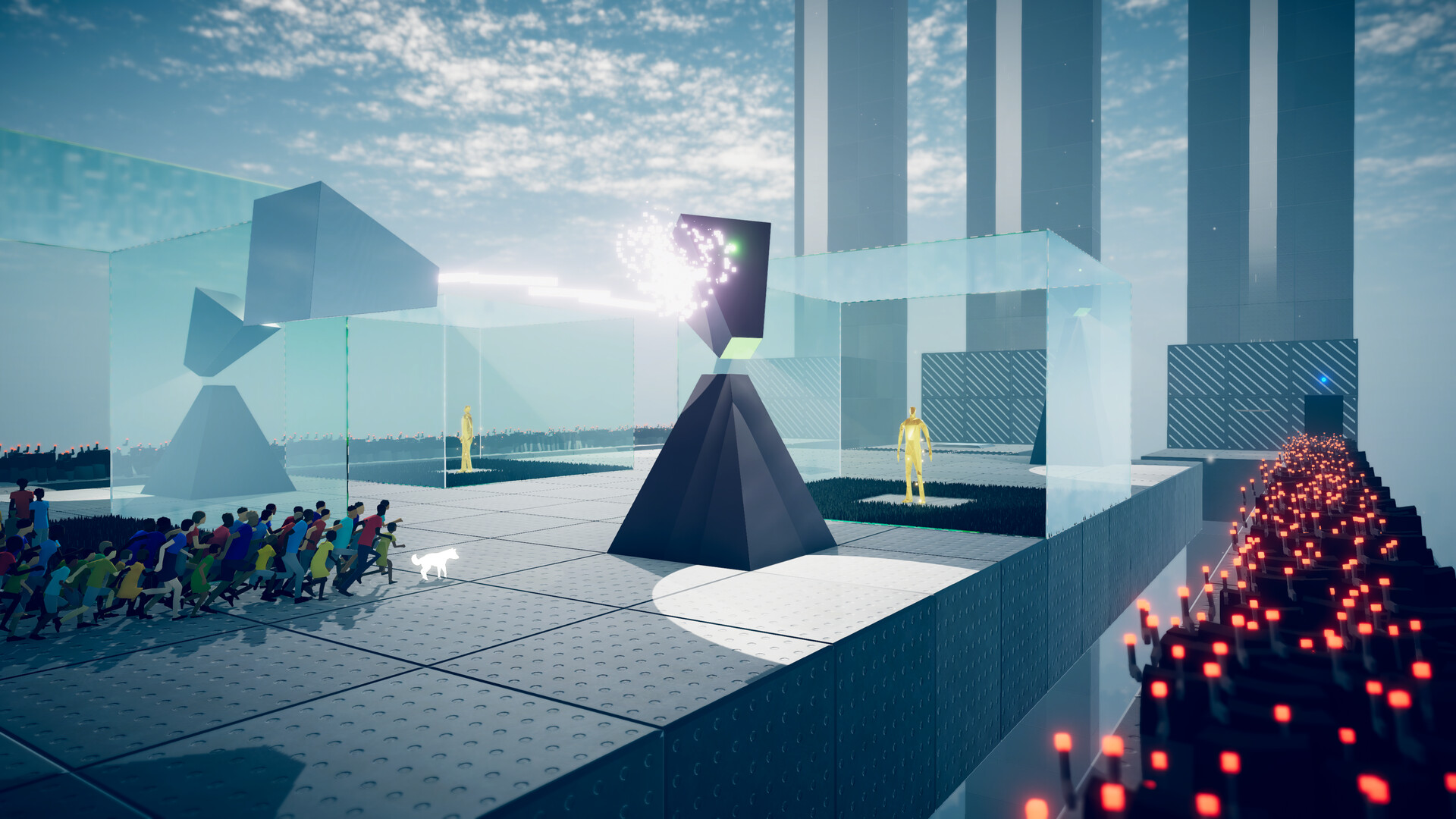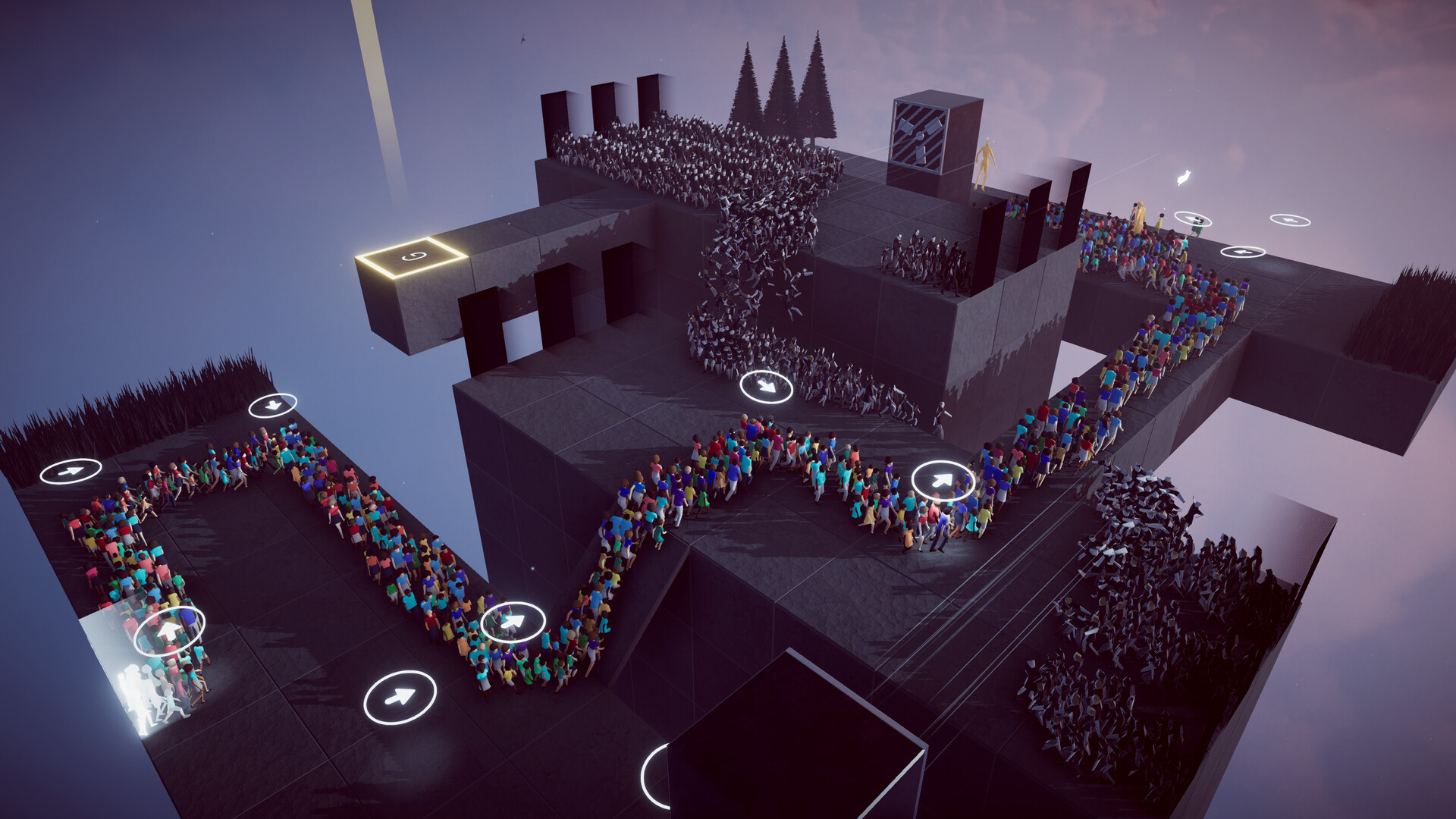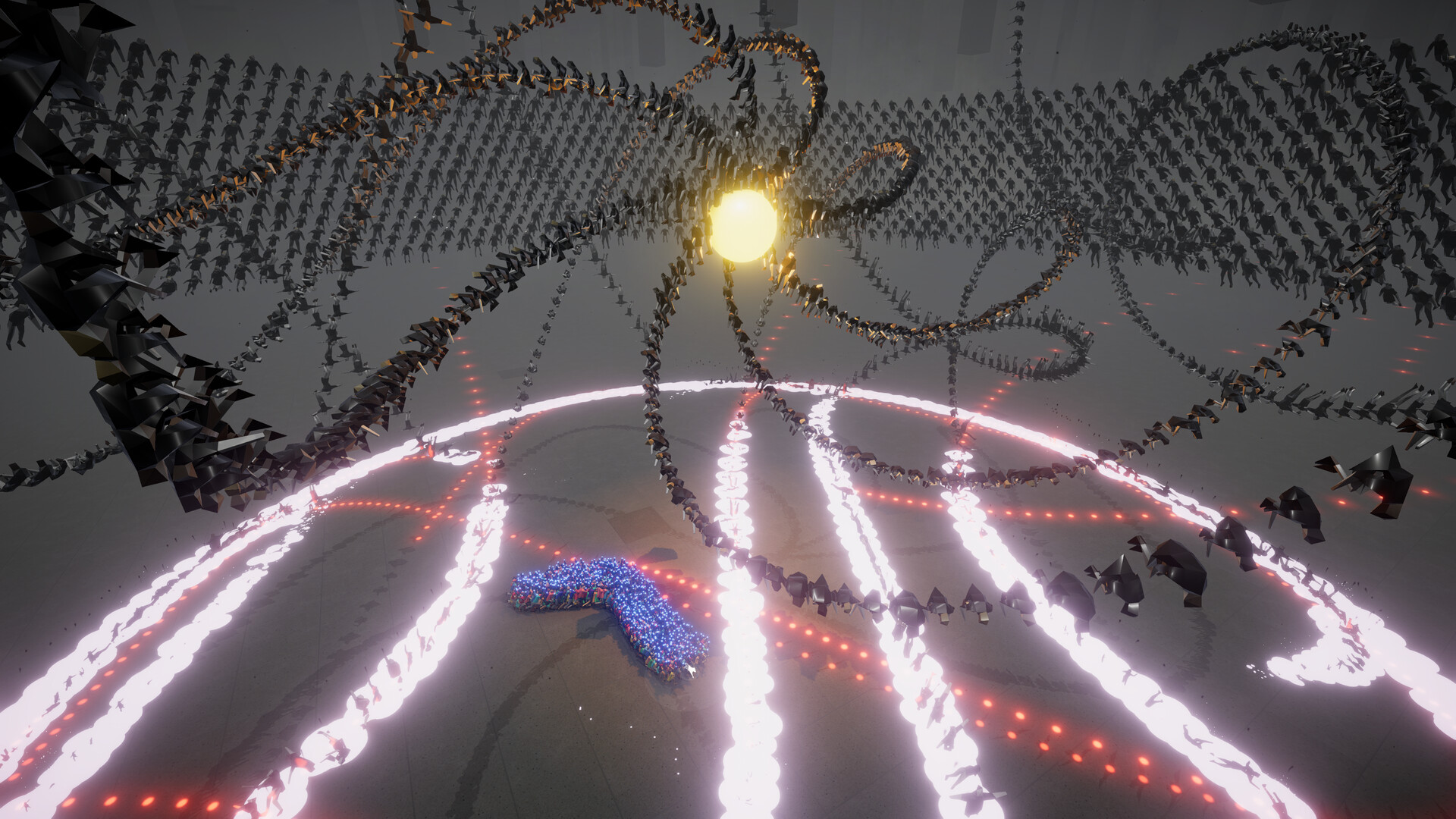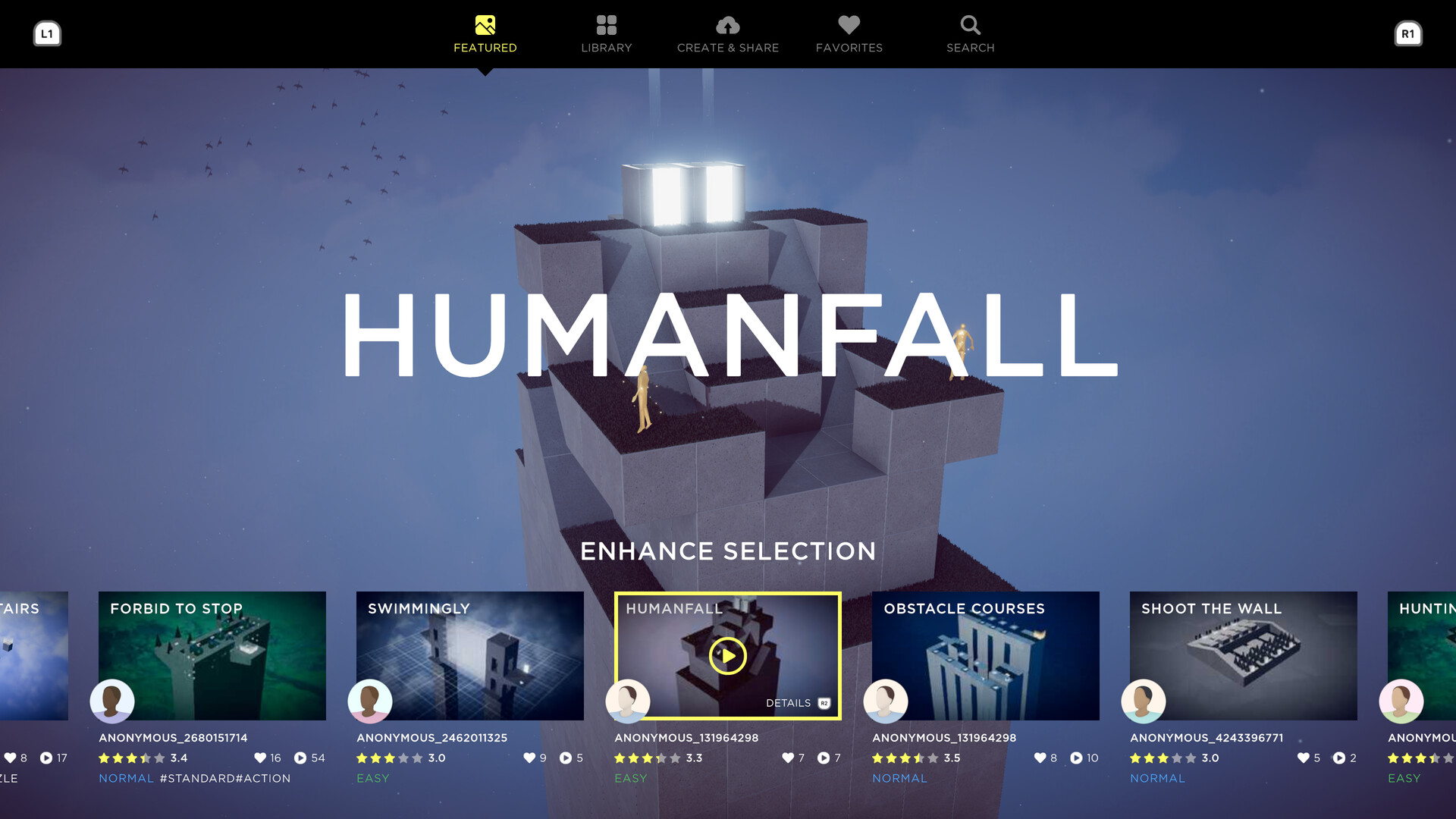Mizuguchi’s latest game Humanity is another abstract masterpiece
Any time Rez and Lumines creator Tetsuya Mizuguchi comes out with a new game, I sit up and pay attention, because I know that it’s going to be quite an experience. And Humanity, Mizuguchi’s new project developed in collaboration with renowned designer Yugo Nakamura, is a wonderful addition to his body of work.
In Humanity, you take on the role of someone who, for reasons initially unknown, has awakened as a glowing Shiba Inu in a peculiar, abstract environment. Hordes of humans emerge from a glowing portal and begin walking straight ahead, and your goal is simple: get them safely to a pillar of light.

If that sounds a little bit Lemmings, you’d be right to an extent, though it’s worth noting that Humanity does a number of things differently from the DMA Design classic. Notably, there’s no requirement to save a specific number or proportion of humans in order to pass a level; instead, the game is more about creating a “flow” of people, ensuring that enough humans are regularly flowing into the exit portal that it fully activates and completes the level.
There are also optional objectives on each level, known as Goldies, who are large golden humanoid figures which must be acquired by first touching them with the stream of humans, which causes them to start walking along with their smaller peers, and then ensuring they safely make it to the exit. The Goldies are the exception to the “it doesn’t matter if you lose anyone” rule; if you drop a Goldy off the edge of the stage or find some other means of killing them, they’re gone until you restart the stage.
To interact with Humanity, you control the aforementioned dog avatar in the style of a 3D platformer. By moving around the stage, you are able to place “commands” for the humans, beginning with simple instructions to turn in a particular direction, but subsequently offering additional abilities such as jumping in various ways, floating to defy physics, following your avatar and many more.

Unlike many other games with a similar control scheme — besides Lemmings, there’s also a touch of Sega legend Chu Chu Rocket in there — there are no limitations on the commands you can place, though some levels require you to collect a particular item with your avatar before you’re able to use the command in question.
Humanity encourages experimentation in the way that it doesn’t penalise you for losing regular humans; essentially, the aim on each stage is to create a well-oiled “machine” or sorts that allows you to achieve something, and this often requires you to make various tweaks to the process along the way in order to keep things running smoothly. In some stages, you’ll need to find ways to separate groups of humans from the main “stream” in order to power switches (which require a continual flow of humans passing over them, much like the exit tiles) while in others you’ll need to manage multiple flows from the outset.
Humanity’s structure splits the game into several “sequences”, each of which gradually introduce various mechanics over the course of multiple individual “trials”. The difficulty is paced absolutely brilliantly, with the stages allowing you plenty of opportunity to get to grips with new abilities without ever feeling like the overall structure is bogging you down in doing one thing for too long.

There are some surprising ways in which the game changes and evolves as you play, too; while the initial stages are simply about getting the humans from A to B, subsequent stages introduce new gimmicks such as pushing blocks around to manipulate the stage layout and even combat against the mysterious “Others”. The game is still a puzzle game at its core, though, so if you’re not a fan of real-time strategy, don’t let the combat elements put you off!
Humanity is a beautifully designed game, with brilliant, clear, abstract graphics and a wonderful electronic soundtrack accompanying proceedings. While the game doesn’t go out of its way to bash you over the head with its more “artistic” aspects, there’s a wonderful sense of symbolism to the gameplay, too; the endless churn of people will be familiar to anyone living life in the 21st century, as is the necessity to “sacrifice” people from the main pathway to success in order to lift up others.
The mysterious entities encouraging you to proceed on your quest reassure you that you shouldn’t mourn for the humans who are “lost”, because they’ll eventually find their way back through the doors again, having another opportunity to reach the pillar of light another time. It is the cycle of life, death and rebirth — though crucially for those who are just in this for the gameplay, the game doesn’t make a big deal about all this. It’s just there as an additional layer to appreciate if you’re so inclined.

With 90 story mode stages, there’s more than enough in the base game to keep you busy for a long time — but that’s not where the Humanity experience ends. There’s a stage creator, too, and your own custom creations can be shared online. This, naturally, also means that you can explore what others have created using the tools available to them — and, as always with interactive creative toolsets like this, it’s impressive to see exactly what is possible within the constraints of the game mechanics.
Humanity is an absolutely brilliant game that any fans of Mizuguchi or Nakamura’s work should jump right on. It’s the perfect antidote to the bombast of triple-A, a wonderfully contemplative experience if you allow it to be — and simply a well-designed puzzle game with some really interesting mechanics to engage with.
Humanity is available now for PS4 and PS5 (including PSVR and PSVR2 support respectively) and Windows PC via Steam. PlayStation Plus subscribers can nab it as part of an Extra subscription at the time of writing.
Join The Discussion
Rice Digital Discord
Rice Digital Twitter
Rice Digital Facebook
Or write us a letter for the Rice Digital Friday Letters Page by clicking here!
Disclosure: Some links in this article may be affiliate links, which means we may earn a small commission if you make a purchase after clicking on them. This is at no additional cost to you and helps support Rice Digital!
- Letter from the Editor: passing the torch - June 30, 2023
- Super Woden GP 2 is looking promising - June 30, 2023
- Inti Creates is making a 32 bit-style Love Live action platformer - June 26, 2023




